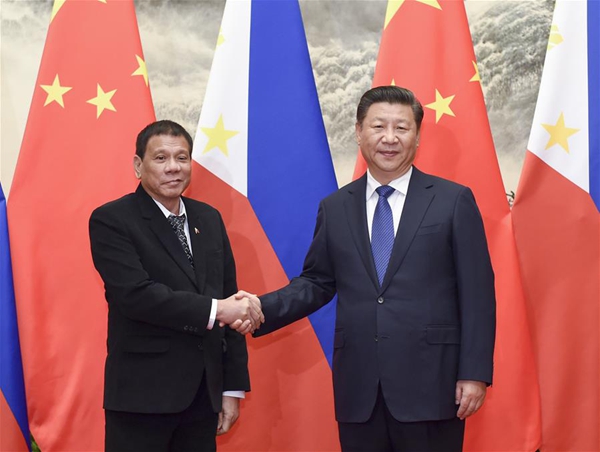Duterte's China visit: A pivot towards Beijing?
- By George N. Tzogopoulos
 0 Comment(s)
0 Comment(s) Print
Print E-mail China.org.cn, October 21, 2016
E-mail China.org.cn, October 21, 2016
|
|
|
Chinese President Xi Jinping (R) holds talks with his Philippine counterpart Rodrigo Duterte in Beijing, capital of China, Oct. 20, 2016. (Xinhua/Li Xueren) |
Since May 2016, the new President of the Philippines, Rodrigo Duterte, has been attracting much attention due to his atypical (some might say undiplomatic) rhetoric and his distinctive, uncommon style.
U.S. President Barack Obama portrayed him as "a colorful guy" during last month's Hangzhou G20 Summit after being informed about some of his personally insulting comments.
Duterte has also received much publicity due to his ongoing war against drugs. Although this was one of his pre-election promises, to fight against crime and corruption, the large number of victims has raised eyebrows as to whether it can be effective.
Now, the Philippines leader comes to the center of attention due to his economic and foreign policy calculations. His decision to visit China and meet his Chinese counterpart, Xi Jinping, Primere Li Keqiang and top legislator Zhang Dejiang should likely lead to improved bilateral ties.
Data provided by the Philippine Statistics Authority demonstrates that China was the country's second largest partner in 2015 following Japan, with the U.S. in third place. Total bilateral trade was worth of $17.646. Chinese exports reached $6.175 billion and imports $11.471 billion.
This harmonious economic collaboration can be further strengthened. The implementation of the Belt and Road (B&R) initiative, with its emphasis on infrastructure by Beijing, and new financial instruments such as the Asian Infrastructure Investment Bank (AIIB) offer good opportunities for Manila to explore its active involvement and long-term potential benefits.
Commenting on Duterte's China visit, an editorial in Business Mirror - an influential economic title in the Philippines - foresaw the day when the country's "goods might flow to the rest of Asia and Europe using B&R." In addition, Beijing's investments could nicely complement Manila's infrastructure-spending ambitions.
Apart from economics, Duterte's China visit has acquired a strong political dimension. His steady anti-American rhetoric in parallel with his public vow to step away from the policies of his predecessor, Benigno Aquino III, vis-à-vis the U.S., and to reconsider the traditionally close military cooperation with Washington, show signs of a critical reorientation of Philippine foreign policy dogma.
More importantly, Duterte seems determined to solve the dispute with the Chinese administration over the South China Sea at the bilateral level, although recent legal arbitration at The Hague favored his country.
The gradual pivot of the new Philippines leader towards China is not welcome in America. That is because it possibly jeopardizes the evolution of Washington's new strategy in Asia, often called a "rebalancing" initiative.
In November 2011 then U.S. Secretary of State and current presidential candidate Hillary Clinton argued that the Philippines - along with Australia, Japan, South Korea and Thailand - were "the fulcrum" for Washington's approach to the Asia Pacific region.
In her view, these five countries were enhancing their regional leadership at a time of evolving security challenges. In November 2015, meanwhile, President Obama said after a meeting with Aquino at the White House that the U.S. "supports the Philippines' decision to use arbitration under the UN Convention on the Law of the Sea to peacefully and lawfully address differences" [with China].
Now, Time magazine saw the opening of a new chapter in the relationship between China and the Philippines, and especially Duterte's intention to negotiate bilaterally on the South China Sea issue, as "a win for Beijing."
This may well be a correct assessment. Nevertheless, what matters more is not whether current developments signal a diplomatic victory for the Chinese administration, but what they mean for Asian stability.
The preservation of peace is the utmost objective. As long as Duterte serves this need, his policy should be regarded positively. The Manichean logic leads nowhere because a conflict in South China Sea will damage all sides involved.
Last but not least, the visit of the Philippines leader to China raises the question as to whether improvement of bilateral ties has strategic depth or is rather superficial and provisionary. Critics of Duterte believe he is only pretending to bargain, and will not risk losing American military support in the long-term.
His forthcoming visit in Japan, they say, falls within his intentions to keep a balance. No scenario should be excluded in politics and international relations. It should be mentioned, though, that the country having the upper hand in negotiations is China and not the Philippines.
Beijing is therefore able to practically test the sincerity of Duterte and figure him out by employing the "carrot and stick" approach. No blank check for Chinese investments and aid will be given.
George N. Tzogopoulos is a columnist with China.org.cn. For more information please visit:
http://www.china.org.cn/opinion/GeorgeNTzogopoulos.htm
Opinion articles reflect the views of their authors, not necessarily those of China.org.cn.







Go to Forum >>0 Comment(s)